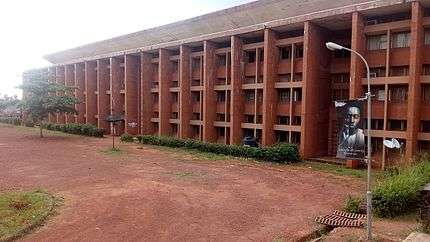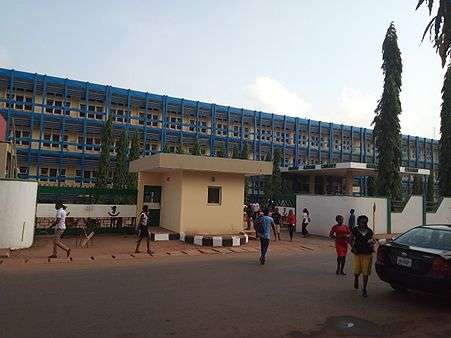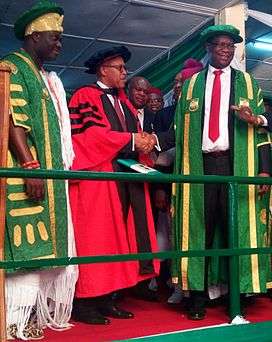University of Nigeria
The University of Nigeria, commonly referred to as UNN, is a federal university located in Nsukka, Enugu State, Nigeria. Founded by Nnamdi Azikiwe in 1955 and formally opened on 7 October 1960, the University of Nigeria has four campuses – Nsukka, Enugu, and Ituku-Ozalla – all located in Enugu State and Aba campus in Abia State
Former names |
|
|---|---|
| Motto | To Restore the Dignity of Man |
| Type | Public |
| Established | 1955 |
| Founder | Nnamdi Azikiwe[1] |
| Vice-Chancellor | Charles Igwe Arizechukwu |
Academic staff | 1,519[2] |
| Students | 36,000[3] |
| Location | , Enugu , 6°51′24″N 7°23′45″E |
| Campus | Rural 871 hectares (2,150 acres) (Nsukka campus) Urban 200 hectares (490 acres) (Enugu campus) 500 hectares (1,200 acres) (Ituku-Ozalla campus)[4] |
| Colors | Green and white |
| Nickname | Lions and Lionesses |
| Mascot | Lion |
| Website | unn.edu.ng |
The University of Nigeria was the first full-fledged indigenous and first autonomous university in Nigeria,[5] modelled upon the American educational system. It is the first land-grant university in Africa and one of the five most reputed universities in Nigeria. The university has 15 Faculties and 102 academic departments. The University offers 108 undergraduate programs and 211 postgraduate programmes.[6]
The university celebrated its 50th anniversary on October 2010.
History
A law to establish a University in the Eastern Region of Nigeria was passed on 18 May 1955.[7] While that date marks the formal beginning of the history of the University of Nigeria, the enactment of this legislation by several Nigerian leaders, and inspired particularly by the then Premier of the Eastern Region, Dr. Nnamdi Azikiwe.
One of the first steps taken by the Eastern Nigeria Government towards the implementation of its commitment was an invitation to both the United States of America and the United Kingdom to send advisers to help in the planning of physical and educational aspects of the proposed university.
Under the joint auspices of the Inter-University Council for Higher Education and Overseas and the International Co-operation Administration (now the United States Agency for International Development), J.W. Cook, Vice-Chancellor of the University of Exeter, Dr John A. Hannah, President of Michigan State University and Dr Glen L. Taggart, Dean of International Programs at the same university, came to Nigeria in 1958. The team surveyed the site at Nsukka, and extensively investigated a great variety of factors pertinent to the establishment of a new university.
The results of their efforts were contained in a white paper issued by the Eastern Nigeria Government on 30 November 1958. They had recommended "that the development of the University of Nigeria based upon the concept of service to problems and needs of Nigeria, is a desirable project and one that should receive support from any source which could help to make it a sound endeavor".
They further recommended that a provisional council be established to "draw upon the technical and consultative resources available throughout the world for help in planning the institution".
The provisional council, authorised by the Eastern Nigeria Legislature, was appointed by the Governor in Council in April 1959, and given necessary financial and administrative powers to build a sound university. It reflected the spirit of international co-operation which has given birth to the institution. It consisted of Dr. Nnamdi Azikiwe, Chairman, Dr. T. Olawale Elias and Dr. Okechukwu Ikejiani from the Federation of Nigeria, J.S. Fulton from the United Kingdom, Dr. Marguerite Cartwright and Dr. Eldon Lee Johnson from the United States of America.
The University was formally opened on 7 October 1960, as the climax to the Nigerian independence celebrations in the Eastern Region. Her Royal Highness, Princess Alexandra of Kent, representing Her Majesty Queen Elizabeth II at the Nigerian independence celebrations, performed the opening ceremonies and laid the foundation stone of one of the University's early buildings.
Classes began on 17 October 1960 with an enrollment of 220 students and 13 members of the academic staff. The opening convocation addresses were delivered by the Chairman of the Provisional Council, Dr Nnamdi Azikiwe, the first President of the Federation of Nigeria, and by Dr John A. Hannah, President of Michigan State University, USA.
The university was fully autonomous, with the power to grant its own degrees. Technically speaking, therefore, it became the first fully-fledged university in Nigeria, since Ibadan was still at that time a university college granting London degrees. It also became the first university established by a Nigerian Regional Government. The University College Ibadan, the oldest degree awarding institution, cut its umbilical cord with London in January 1963, becoming the University of Ibadan. In July 1967, it turned out the first graduates holding Ibadan (rather than London) degrees,[8] by which time Nsukka had produced two crops of graduates and taken all the publicity for turning out the first graduates of an autonomous Nigerian university.[9]
Campus
The University has four campuses – Nsukka (University of Nigeria, Nsukka, UNN), Enugu (University of Nigeria Enugu campus, UNEC), Ituku-Ozalla (University of Nigeria Teaching Hospital, UNTH) and Aba (University of Nigeria Aba campus, UNAC).
The main campus of the University is located on 871 hectares of hilly savannah in the town of Nsukka, about eighty kilometres north of Enugu, and enjoys a very pleasant and healthy climate. Additionally 209 hectares of arable land are available for an experimental agricultural farm and 207 hectares for staff housing development. There is regular road transport between Nsukka and Enugu, and Nsukka is also quite easily accessible from all parts of Nigeria. There are modern shopping facilities and a large market in Nsukka town. The Nsukka campus houses the Faculties of Agriculture, Arts, Biological Sciences, Education, Engineering, Pharmaceutical Sciences, Physical Sciences, Social Sciences, and Veterinary Medicine.
The former Nigerian College of Arts, Science and Technology, Enugu, was incorporated into the University in 1961, and its buildings now form the Enugu Campus (200 hectares) of the University located in the heart of Enugu, the administrative capital of Enugu State of Nigeria. Enugu is a modern city, accessible by air, rail and road. The Faculties of Business Administration, Environmental Studies, Law and Medical Sciences are located at the Enugu Campus.
The teaching hospital (UNTH) attached to the University is presently sited at Ituku-Ozalla (25 kilometres south of Enugu) on a 500 hectare site. It also hosts the Faculty of Dentistry and Health Sciences and Technology.

The Aba campus (UNAC) hosts the National Institute for Nigerian Languages.
A former campus was opened in October 1973 in Calabar, Cross River State. The campus at Calabar became a full-fledged University of Calabar in October 1977.
The official name of the University is University of Nigeria[10] and the official acronym of the name UNN. "UN" stands for University of Nigeria while the last "N" stands for Nsukka. This acronym is also shared by the main campus of the University, Nsukka (University of Nigeria, Nsukka). Thus technically, the name University of Nigeria, Nsukka refers to the main campus at Nsukka only while the name University of Nigeria refers to all the campuses of the University. References may be made to the location of the other campuses by mentioning the names of the cities where they are situated rather than a blanket description with the name Nsukka. Students at the Enugu Campus prefer to write the name of their school as University of Nigeria Enugu Campus (UNEC)[11] if they must add the location of their school. Students from other campuses of the school also prefer same. Official documents of the school describes the school as simply University of Nigeria. They also make the dichotomy when referring to different campuses of the school.
Academics
Novelist Chinua Achebe held research and teaching appointments at the university, beginning in the early 1970s. He worked in the faculty of arts with critic and African literature scholar Donatus Nwoga.[12] The Astrophysicist Sam Okoye founded the Space Research Center in 1972. The SRC remains one of the few institutions in Africa that researches and offers courses in astronomy at both the undergraduate and graduate levels.
The medical school, in Enugu, has most of it activities in the University of Nigeria Teaching Hospital (UNTH), where doctors and other health workers are trained with high standards and have proven over the years that they can effect a significant positive change in Africa and the entire world's healthcare system. Doctors and nurses trained in the institution have contributed to the advancement of medicine.
The first open heart surgical operation in Nigeria and sub-Saharan Africa was undertaken in 1974 at the University of Nigeria Teaching Hospital (UNTH) Enugu. The team was led by visiting Professor Yacoub from the UK and others in the team included Professors F.A. Udekwu and Anyanwu. The College of Medicine has since evolved into the centre for cardiothoracic surgery and tropical cardiology excellence for the West Africa region with the siting of the National Cardiothoracic Center at UNTH Enugu. Much medical research is also being carried out in the college. Most of the projects are nearing completion, but it is pertinent to note that some too, have fallen short of completion due to lack of finances and the Government's reluctance to fund private research.
The Department of Fine and Applied Arts is known for the Nsukka group – seven artists associated with a system of traditional Igbo designs and styles known as uli.[13][14] The seven artists are Uche Okeke,[15] Chike Aniakor,[16] Obiora Udechukwu,[17] El Anatsui,[18] Tayo Adenaike,[19] Ada Udechukwu,[20] and Olu Oguibe.[21]
The Law Faculty of the University is the oldest in Nigeria; it was established in 1960. It has contributed to legal education in Nigeria and has trained lawyers such as the former Vice President; Alex Ekwueme, in law practice.
The Department of Electronic Engineering was named a Center of Excellence in Electronics by the Federal Government of Nigeria in 1982. It is one of the most sought after programs to study at the university. The department has consistently produced the Best Graduating Student of the University and Best Graduating Student in the Faculty of Engineering. It is the first and only school in Nigeria to have Electronics Engineering as an Independent Department.
Of recent a lot of work has emanated from the Department of Pharmacology and Therapeutics where a new agent against HIV was derived from a local plant source. Named "irab" the new agent is thought to be a fusion inhibitor and studies in initial clinical trials have shown astounding results. Noteworthy also is finding a novel application for an otherwise old drug. Piperazine citrate which is a cheap and safe anthelmintic agent that has almost gone into disrepute was shown to have anti-arryhthmic properties by studies in the department. The investigators have also established that piperazine can protect the heart against sudden cardiac death from ventricular fibrillation.
Library

The University of Nigeria, Nsukka Libraries consist of the Nnamdi Azikiwe Library, the Enugu Campus Main Library and the Medical Library located at the College of Medicine, University of Nigeria Teaching Hospital, Ituku-Ozalla.
UNN and Roar Nigeria Hub
Roar Nigeria Hub is one of the full-fledged university embedded ICT Hub in West Africa. Located in University of Nigeria, an institution with a student population of nearly 40,000 and 12 institutions of higher learning within an hour drive from Enugu city. The immediate past Vice Chancellor, Professor Benjamin Chukwuma Ozumba drove to create a smart university led to the hub becoming a private sector driven initiative by two engineering graduates of the university.[22]
Alumni and faculty
Vice-Chancellors

The Vice-Chancellor is supported by two deputy vice-chancellors. Former and current persons who have fulfilled the position are:
- Professor Charles Igwe Arizechukwu: June 2019–Present
- Professor Benjamin Chukwuma Ozumba: June 2014–June 2019
- Professor Bartho Okolo: 2009 – June 2014
- Professor Osita Chinedu Nebo: June 2004 – June 2009
- Professor Ginigeme Francis Mbanefoh: 1999 – 2004
- Professor Umaru Gomwalk: May 1994 – (appointed as the Sole Administrator)
- Professor Oleka K. Udeala:1992 – 1995
- Professor Chimere Ikoku: 1985 – 1992
- Professor Frank Nwachukwu Ndili: 1980 – Oct. 1985
- Professor Umaru Shehu: 1978 – 1979
- Professor James O. C. Ezeilo: 1975 – 1978
- Professor Herbert C. Kodilinye: 1971 – 1975
- Professor Eni Njoku: July 1966 – 1967; 1967 – 1970
- Professor Glen L. Taggart: 1964 – 1966
- Dr. George Marion Johnson: 1960 – 1964
Affiliate institutions
Below are some approved affiliate institutions of the University of Nigeria, Nsukka by the National Universities Commission (NUC).[23]
- St. Paul’s College, Awka
- Yaba College of Technology Lagos
- College Of Education, Ikere-Ekiti (Regular)
- Spiritan International School of Theology, Attakwu, Enugu
- Spiritan School of Philosophy, Issienu, Nsukka
- Trinity Theological College, Umuahia
- West Africa Theological Seminary, Ipaja, Lagos
- College of Education, Nsugbe
- Digital Bridge Institute, Abuja
References
- "History/Overview". Unn.edu.ng. Retrieved 21 February 2016.
- Participating Institutions. Delphe326nigeria.org. Retrieved on 17 October 2011.
- "Through the years | University of Nigeria". Unn.edu.ng. Archived from the original on 8 July 2011. Retrieved 24 January 2014.
- The University of Nigeria Calendar, 1991 – 1993
- ""University of Ibadan is NOT the first university in Nigeria" by Abdussalam Amoo". EduCeleb.com. 22 May 2019. Retrieved 26 May 2019.
- University of Nigeria. Unn.edu.ng. Retrieved on 17 October 2011.
- ""The University of Nigeria Speech" by Nnamdi Azikiwe". Blackpast.org. 18 May 1955. Retrieved 24 January 2014.
- "Archive". UI Archive. University of Ibadan. Retrieved 26 May 2019.
- University Development in Africa – The Nigerian Experience by Chukwuemeka Ike, Oxford University Press, 1976, pp 9
- University of Nigeria Act
- See UNEC POST- an annual magazine of the Students Union Government of the University of Nigeria, Enugu Campus
- Matzke, Christine; Raji, Remi; Raji-Oyelade, Aderemi; Davis, Geoffrey V. (2006). Of Minstrelsy and Masks: The Legacy of Ezenwa-Ohaeto in Nigerian Writing. Rodopi. ISBN 978-90-420-2168-6.
- The Poetics of Line. Africa.si.edu. Retrieved on 17 October 2011.
- The Poetics of Line. Africa.si.edu. Retrieved on 17 October 2011.
- The Poetics of Line. Africa.si.edu. Retrieved on 17 October 2011.
- The Poetics of Line. Africa.si.edu. Retrieved on 17 October 2011.
- The Poetics of Line. Africa.si.edu. Retrieved on 17 October 2011.
- The Poetics of Line. Africa.si.edu. Retrieved on 17 October 2011.
- The Poetics of Line. Africa.si.edu. Retrieved on 17 October 2011.
- The Poetics of Line. Africa.si.edu. Retrieved on 17 October 2011.
- The Poetics of Line. Africa.si.edu. Retrieved on 17 October 2011.
- Lanre, Ogungbe (28 March 2017). "University of Nigeria houses one of the First technology Hubs in West Africa. - Biznespreneur". Biznespreneur. Retrieved 28 March 2017.
- "Approved Affiliations". National Universities Commission. Retrieved 2 October 2018.